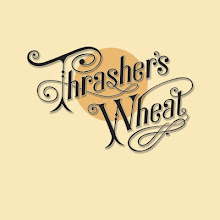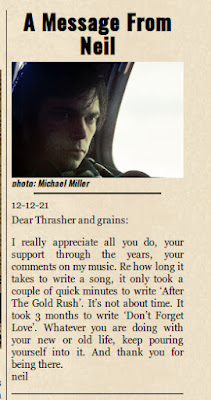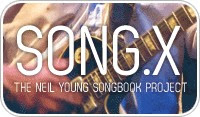The "Cinema-ism" of Neil Young


Sundance Film Festival for the premiere of "Heart of Gold" - 2006
(Click photo to enlarge)
The mutaul respect between Neil Young and filmmaker Jonathan Demme has been quite deep and evident for some time now.
And with their latest film together Journeys being released, they've done quite a few interviews together and separately. Here's a particularly interesting interview from
The Republic by Greg Kot:
Q: Jonathan, out of all the subjects and artists you could’ve focused on, why did you choose Neil’s music to explore in such depth?
Demme: Cinema.
Neil’s the most cinematic person that I can think of.
He writes cinematically, moves cinematically, walks cinematically, thinks and writes cinematically. I’m looking at him now and there is some cinema chip inside of him. (Young laughs). All these stories in these songs are different, and the characters he assumes are so different, he never repeats himself in the way he presents himself in the music. It’s this endless kind of thing. I have lots of ideas for movies. I would love to do a spoken word movie with Neil. He’s a human fountain of cinema.
I admire him so much — forget the music, he’s one of my all time life-enriching sources. I love his sensibilities as a filmmaker.
I know what he likes. We’re very free, open, when we work together.
More on Neil Young Journeys Film Premiere and Jonathan Demme and Neil Young.
Labels: jonathan demme, neil young































 Human Highway
Human Highway

















 Concert Review of the Moment
Concert Review of the Moment





 This Land is My Land
This Land is My Land

 FREEDOM In A New Year
FREEDOM In A New Year









 *Thanks Neil!*
*Thanks Neil!*




![[EFC Blue Ribbon - Free Speech Online]](http://www.thrasherswheat.org/gifs/free-speech.gif)











 The Unbearable Lightness of Being Neil Young
The Unbearable Lightness of Being Neil Young Pardon My Heart
Pardon My Heart



 "We're The Ones
"We're The Ones  Thanks for Supporting Thrasher's Wheat!
Thanks for Supporting Thrasher's Wheat!




 This blog
This blog 
 (... he didn't kill himself either...)
#AaronDidntKillHimself
(... he didn't kill himself either...)
#AaronDidntKillHimself









































































 Neil Young's Moon Songs
Neil Young's Moon Songs




 Civic Duty Is Not Terrorism
Civic Duty Is Not Terrorism Orwell (and Grandpa) Was Right
Orwell (and Grandpa) Was Right


 What's So Funny About
What's So Funny About 



7 Comments:
There was an article in the Broken Arrow fanzine in the late 1980s about cinematic aspects of Neil's work. You can read it online.
[disclosure: I wrote it, so feel free to tell me it's a piece of crap ;-)]
Nice to hear from you David.
Yes, we do recall this article in BA. Definitely not a POC. We may've even blogged it at some point.
Your writing on how Powderfinger is like a film script with camera and audio cues is spot on. And the business cutting up and rearranging of narrative into non-linear sequences is brilliant. Cortez the Killer being the prime example of separating lyrics in time and space with film-like jump cuts.
stay in touch.
thanks.
David, you were ahead of your time writing about your observations about the way the muse comes to Neil. He definitely is visually abled and gifted for putting it to music.
Demme and Neil ... one of the great collaborations Neil's had over the many years ... and its kinda cool that its happened in the latter years ... the chemistry between the two is palpable and the mutual respect is there ... and Demme all things aside just adores Neil which is very cool because it seems like Neil gives Demme a lot of leeway to make these films
I loved it when Demme made Stop Making Sense. I think I'll watch that tonight. It was the only good thing about the 80s.
Jonathan has put a lot of heart into this project and Neil gets that because he operates the same way. You know that scene in Casablanca when Claude and Bogart walk out into the fog? That's Neil and Demme.
I hope that the film will get good word of mouth and reviews. I hated Shakey. It just added more layering to Neil's legendary status. I love that Demme got on board as Neil's biographer, Dan. Demme captures perfectly the Neil we know is there but never get to see because he is so private and protected. He lets his guard down around Demme because he trusts Demme. Demme has nothing to gain from his friendship with Neil since.
It's funny that a Neil Young fan would profess to hating Shakey, and I'm not sure what the "adding layers" comment meant... Like it's bad to know more about him, to have a deeper more comPlex picture? Or are you saying that the facts and conversations as recorded in the book are not factual? And if you are, please provide evidence, because I've never seen any. I've been rereading the book this week for about the twentieth time because, after dealing with the people on this site, I need to go back to the artist and his own words about his life to renew my love for his work. Neil Young is far far more honest about himself and his failings than almost anyone who participates in these discussions and I find it highly curious that someone who posts in great volume on here would say they hate the book.
Sometimes you can know too much about a person and end up knowing very little about him. There are a few notations I made in the book but my book is being borrowed at the moment. I think Neil's work actually says more about his life than what any person can say. The only thing worth reading in that book is the italicized print at the beginning of each chapter but like most of our own memories and recollections of our past, our perspectives change because we're never standing still.
Post a Comment
<< Home